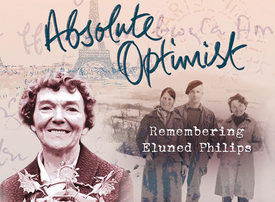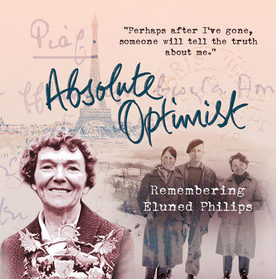Adam Somerset reviews Absolute Optimist by Menna Elfyn which commemorates the centenary of women’s suffrage.

Menna Elfyn’s study of the poet Eluned Phillips was first published by Gomer in 2016. Honno’s new version, translated into English by Elinor Wyn Reynolds, performs a threefold service for a new readership. It presents to a broader audience an important woman of Wales. It includes a selection of verse and it provides critical insight into cultural debates of times not far past.
The subtitle is Remembering Eluned Phillips. If it deals lightly on biography, which was guarded with privacy, it is the work of a poet engaged in matters poetic. The book’s first words are:
In this account, you will experience waves of happiness and rough currents that will bring you into sunlight and sometimes to the edge of the rocks. This has been my experience in putting this book together.
A line about her subject’s time in Paris is an indicator of the sprightliness of style. Jean Cocteau is introduced as “an artist much admired by Eluned, and whom she accidentally trod on one time while he slept on the floor in Edith Piaf’s flat in Montparnasse.”
Absolute Optimist – the description is by Phillips of herself – is a significant addition to the public record. The entry for Wikipedia is crisp but gets to the core: “Eluned Phillips (27 October 1914 – 10 January 2009) was the only woman to win the bardic crown at the National Eisteddfod of Wales twice, a feat she accomplished in 1967 at Bala and 1983 at Llangefni… She died of pneumonia, aged 94, at Glangwili Hospital in Carmarthen. At the time of her death, she was the oldest member of the Gorsedd of Bards.”
She was also beneficiary of an obituary by Meic Stephens, composed with his customary elegance. Stephens writes that she was “famously reticent about the details of her life” to the extent that “even in her memoir, The Reluctant Redhead, she was always loath to reveal so much as the year of her birth.” Nonetheless, the arc of life began at Cenarth on the River Teifi. Primary school at Abercych led to Cardigan Grammar School. Early participation in local eisteddfodau inducted her in the rules of cynghanedd. At the age of 22, she was admitted into the Gorsedd of Bards under the name of Luned Teifi.
In one of her most celebrated poems “Llwyd Bach y Baw” she has Edith Piaf as a subject. Her range of acquaintances in London and Paris was extensive, including Augustus John, Dylan Thomas, Maurice Chevalier, Pablo Picasso. Her guide into this world of the 1930s was Dewi Emrys, “the dissolute ex-preacher”, in Meic Stephens’ words, “and talented poet whose life she treated in a biography published in 1971.”
She made a living in London as a contributor to women’s magazines and writing romances. Returning to Newcastle Emlyn worked in a solicitor’s office and served as a court translator. Menna Elfyn cites a line on the significance of the BBC for Welsh writers: “I tackled all sorts of rural activities – The District Nurse; an Auctioneer; Telephone the Plumber; Call the Vet; Gypsy Life; Harvest Home etc. There was such a demand for radio programmes before the onslaught of television.”
The radio programmes are listed on the three pages of the bibliography. The published work was relatively slim, comprising 4 books and 3 libretti. The verse collection Cerddi Glyn-y-Mêl was published by Gomer in 1985. Surprisingly, even a poem from the National Eisteddfod in Bala in 1967 is not in the public domain. Phillips had asked for it to be returned and Menna Elfyn located it among the private papers.
Among the unpublished work is the play Robot which is held by the National Library. Menna Elfyn contributes a valuable piece of theatre criticism in giving it a 20-page analysis. She ends by drawing out the continuity of literary gifts that enabled Phillips to span verse, drama and libretti.
Absolute Optimist ends with 21 pages of the award-winning poetry in translation. The chronicle that leads to its ranges widely. Phillips’ love affair with a Breton nationalist recapitulates Rob Stradling’s writing on Breton groups and the Second World War. Historic names from the National Eisteddfod appear, T Glynne Davies, W J Gruffydd, Thomas Parry, Bobi Jones. A long critique by Alun Llywelyn-Williams from Bala in 1967 is cited. Menna Elfyn herself makes a late appearance. The subject is language and poetry-writing. “I think very highly of Menna Elfyn,” runs Phillips’ essay, “but I must disagree with her viewpoint that there is a danger in writing poetry in English.”
Debate, the lifeblood of criticism, runs through this book. It also includes a verse in tribute from Idris Reynolds and Mererid Hopwood. An englyn was written by Hopwood for the remembrance garden in Cenarth.
Eluned gave light- a melody
Gave sun as company,
Gave magic mischievously,
A golden smile sang with glee.
In this year that commemorates the centenary of women’s suffrage, this new edition of Absolute Optimist is a valuable contribution.
Menna Elfyn will be discussing Eluned Phillips at Cardiff Book Festival on Sept 9th. More details here.
Adam Somerset contributes regularly to Wales Arts Review.











